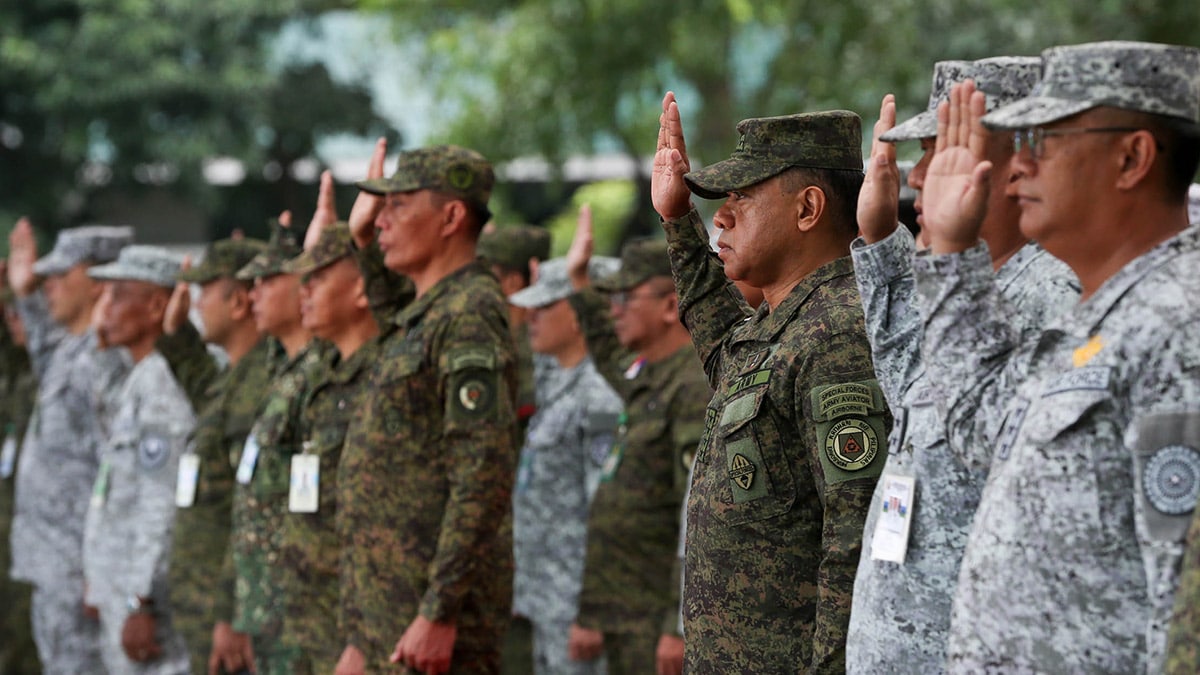AFP branch services lead drills facing West Philippine Sea, Taiwan

PREPAREDNESS Armed Forces of the Philippines Chief of Staff Gen. Romeo Brawner Jr. (third from right) on Monday leads the opening ceremony for the AFP Joint Exercise Dagat-Langit-Lupa that will involve 3,000 active and reserve forces and representatives from the Philippine Coast Guard, Philippine National Police and other government agencies. —Lyn Rillon
MANILA, Philippines — The Armed Forces of the Philippines launched a unilateral joint exercise among its major branch services on Monday to prepare troops to collectively respond “to any external threats” that could challenge the country’s sovereignty.
The AFP Joint Exercise Dagat-Langit-Lupa (AJEX DAGIT-PA) drills from Nov. 4 to 15 will involve 3,000 active and reserve forces in the areas covered by the Western Command and Northern Luzon Command facing the West Philippine Sea and Taiwan, where China has stepped up its aggression as a result of its growing military power.
“Our mission today is very clear, to prepare ourselves comprehensively to respond to any external threats that might challenge our sovereignty,” AFP Chief of Staff Gen. Romeo Brawner Jr. said in his speech during the opening ceremony.
READ: West Philippine Sea: 190 Chinese vessels spotted last week, Navy says
This year’s AJEX DAGIT-PA is a simulation of the military’s territorial defense plan called Bantay Kalayaan, he said. By next year, the AFP will roll out a new campaign plan to unify the internal and external defense campaign plans.
“Eventually, everybody will be involved in territorial defense wherever you are in the country while we are sustaining the gains that we have had for the internal security operations,” Brawner said.
China in ‘front seat’
As in the previous year, a contingent from the Philippine Coast Guard (PCG) and the Philippine National Police will also join the exercises as part of the uniformed services.
The Department of Foreign Affairs, the Department of the Interior and Local Government, and the Department of Social Welfare and Development, among other government agencies, will also be represented in the exercises.
“In case of war, the PCG and PNP will join us to defend the country… We will also work together with other agencies when war arises,” Brawner said.
According to Maj. Gen. Marvin Licudine, AJEX DAGIT-PA exercise director, China is expected to monitor the drills as in previous occasions, but they have “planned and prepared for contingencies” at any rate.
“China will respond the same way they’ve always responded. They have a front seat to the exercise. They are going to watch and we don’t mind,” said AJEX DAGIT-PA executive agent Col. Michael Logico, adding that the exercises are not directed at anybody.
‘Large number’
“This is purposely conducted to improve our combat readiness and to guarantee that our joint forces are fully competent and proficient to carry out their mandate,” he said.
Laoag City Mayor Michael Keon said last month that AJEX DAGIT-PA in his hometown will be held at the city’s dunes in Barangay La Paz, covering the western coastline up to Burgos, Ilocos Norte.
“This will be an exercise to move a large number of troops and equipment from Laoag City to Burgos, which will be a test in logistics organization and maneuvers,” he said in a Facebook post.
Ilocos Norte is located northwest of the Philippines near the West Philippine Sea and Taiwan, which China considers as part of its territory and has not ruled out taking it by force if necessary.
‘Information warfare’
Just over the weekend, Taiwan reported an increase in Chinese military activity around the island as the US presidential election approaches.
China also claims nearly the entire South China Sea, including parts claimed by its neighbors.
The drills in AJEX DAGIT-PA, aside from the usual field and live-fire training, will include for the first time an information warfighting exercise, as the military calls for “strategic communications and information operations in modern defense operations” amid an evolving nature of warfare.
“We need to provide the correct information not just to our countrymen but to the whole world. Fake news has become prevalent and it could turn the tide of war. In other parts of the world with ongoing conflict, there is a very strong information warfare because they want to give their own narrative to the world,” Brawner told reporters.
“It’s the same with what’s happening in the South China Sea or West Philippine Sea. We all know we are being bullied by the Chinese coast guard and Chinese militia but in their own narrative it’s the other way around. It’s fake news, so we have to counter that and we have to rehearse that in times of war,” he said.
For comprehensive coverage, in-depth analysis, visit our special page for West Philippine Sea updates. Stay informed with articles, videos, and expert opinions.


















